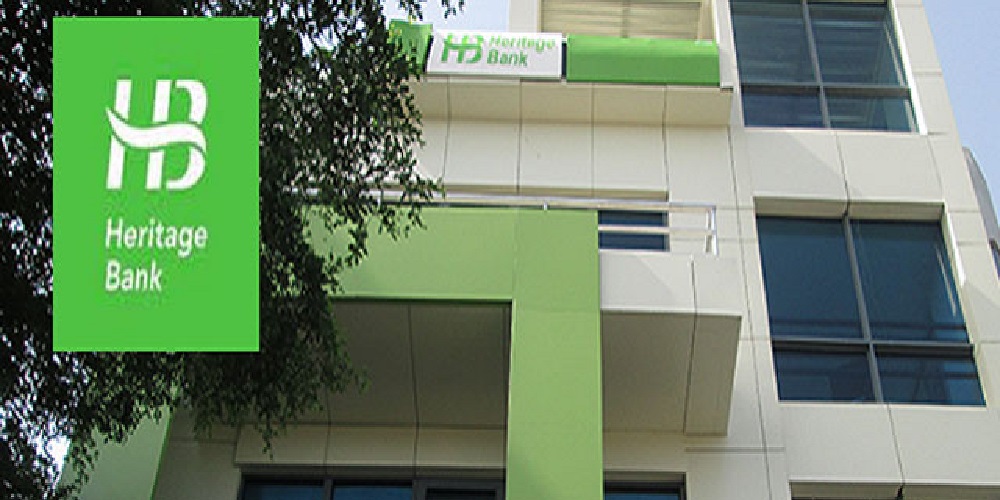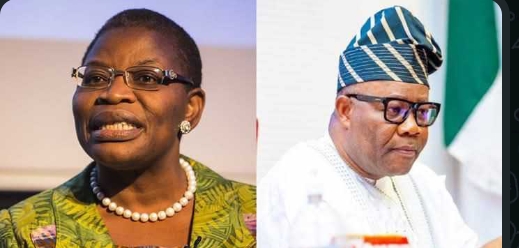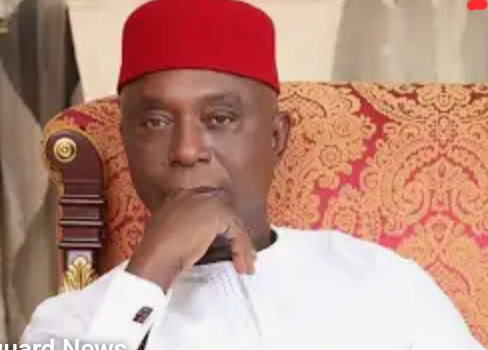News
How Over N400bn First Bank loan nailed Heritage bank

The Central Bank of Nigeria (CBN) has settled the over N400 billion owed to First Bank by the now-defunct Heritage Bank, according to the lender and sources familiar with the matter.
“First Bank had exited the exposure and CBN settled the Bank,” Ismail Omamegbe, the lender’s corporate communications manager, said Tuesday.
Another source confirmed that the CBN has paid off First Bank’s exposure to Heritage, given that its intervention was at the behest of the apex bank under Emefiele.
In 2018, First Bank, serving as the clearing bank for all Heritage Bank cheques, noticed an alarming discrepancy.
Of the cheques cleared for Heritage Bank, a substantial N200 billion remained unpaid. This revelation sent ripples of concern through First Bank’s boardroom.
The gravity of the situation was clear: allowing this debt to persist unaddressed posed a significant risk to the bank’s financial stability. However, the potential fallout from pulling the plug on Heritage Bank was equally daunting.
Godwin Emefiele, then Governor of the Central Bank of Nigeria (CBN), stepped in amid the brewing crisis, with a bold proposition.
The emperor, as he was called in banking circles, offered a central bank guarantee on behalf of Heritage Bank, ostensibly to be executed in 2019. This move, a lifeline for Heritage Bank, was designed to assuage First Bank’s concerns and provide a safety net, backed by the Central Bank’s authority.
During a pivotal board meeting, First Bank’s directors were confronted with a distressing notification from their auditors, PricewaterhouseCoopers (PwC).
The auditors revealed that the much-vaunted CBN guarantee was conspicuously absent. This revelation left the board in a state of shock. Questions were immediately directed at then-Managing Director, Adesola Adeduntan, who defended the bank’s position by asserting that Emefiele had given his word regarding the guarantee.
Despite Adeduntan’s reassurances, the absence of a formal guarantee was a glaring oversight that PwC could not overlook.
Compounding the problem, by this time, the debt had ballooned from N200 billion to N300 billion, exacerbating the financial strain on First Bank. The board’s patience was wearing thin, and they issued a stern directive to Adeduntan to secure the guarantee without delay.
The unfolding debacle reached a climax when the board was unceremoniously sacked by Emefiele who had taken offence to the board’s insistence on a formal guarantee.
The CBN on Monday revoked the licence of Heritage Bank Plc with immediate effect following breaches of banking legislation.
The management “have not been able to improve the bank’s financial performance, a situation which constitutes a threat to financial stability,” it said in an emailed statement.
Heritage Bank has struggled with non-performing loans over the years.
An internal document released on Monday revealed that at least 90 percent of the bank’s active loan portfolio of around N700 billion was considered lost or doubtful as of March 31, 2024. The bank’s tier-1 capital comprising equity, reserves, and accumulated earnings was in a deficit of over N1 trillion.
Internal documents showed that less than 5 percent of outstanding loans were performing, with 90 percent classified as lost. Some of those loans date back to 2018 when the bank reported a loan impairment of N37.5 billion in the first half of 2018.
Depositors of the bank that have alternate accounts within the industry will be paid up to the insured amount of N5 million per depositor using their Bank Verification Number (BVN) to locate their alternate account. Depositors with funds over N5 million will be paid liquidation dividends upon realisation of the bank’s assets and recovery of debts owed to the bank.
News
It’s Awful For Akpabio To Humiliate Female Senators, Kingibe, Natasha;– Ex-Minister Ezekwesili

By Kayode Sanni-Arewa
Ex- Nigerian minister of education, Oby Ezekwesili, has slammed Senate president, Godswill Akpabio, over his alleged misconduct towards female lawmakers.
In a statement issued on Monday, Ezekwesili expressed concerns over Akpabio’s behaviour, citing instances where he allegedly humiliated female senators, including Natasha Akpoti and Ireti Kingibe.
Recall on Saturday that Senator Natasha Akpoti-Uduaghan spoke out about the harassment and exclusion she has faced in the Senate, citing a pattern of behaviour that began after a nightclub incident last year.
In an interview with the Brekete Family, where Akpoti-Uduaghan had revealed that she had been denied privileges, pulled out of international activities, and even had her name struck out from a United Nations event she was nominated for.
The senator claimed that she had been self-funding her trips to international events, which she believed are important for her constituents, Nigerian women, and the country as a whole.
She had also alleged that her seat in the Senate was changed to a location where she would be less visible, suggesting that this was an attempt to silence her or eliminate her from being seen.
Akpoti-Uduaghan’s allegations came after Senate President Godswill Akpabio faced criticism for his sexist remarks against her, with over 300 women groups demanding an unreserved apology.
The incident highlights concerns about gender discrimination and verbal harassment in Nigeria’s political institutions.
Reacting in her statement, Ezekwesili encouraged women in public leadership to stand strong and continue to represent their constituents, emphasising that representation matters.
The former presidential candidate, also warned Akpabio that he would face consequences if he continued to harass women in public leadership.
The statement she shared on her X handle partly read: “I tweeted last year that if not for the rottenness of our Judiciary, Nigerians would not have an @Senator_Akpabio presiding over the upper house of our @nassnigeria – the Nigerian Senate @NGRSenate.
“That statement has been given proof by Mr Akpabio himself in the nearly 2 years of his “leadership” of the Senate.
“One issue stands out. Mr Akpabio implicitly thinks that his even more accomplished female colleagues must be humiliated in order for his ego to be assuaged.”
Ezekwesili added, “Is it not a shame that one day it is @NatashaAkpoti , another day @IretiKingibe and yet another day @NatashaAkpoti that are at the receiving end of the appalling misconduct of the topmost officer of our Legislature?”
“And we wonder why Nigeria shamefully places at the lowest neighborhood of the ranking of countries on Women in public leadership , specifically Legislature at 4.4%.
“I encourage the women in public leadership to never ever lose their Voice. Continue to stand strong in your commitment to citizens and prove that representation matters.
“All aspects of data do in fact show that representation matters a lot.”
The former Vice President of World Bank (Africa Region), warned Senate President to be prepared to face what would come to him next time he harasses any woman well-elected unlike him.
“Next time Mr Akpabio harasses any woman well-elected unlike him and representing her constituency @ the National Assembly or any woman at all anywhere in this country, he must get ready. Enough said.”
Guardian
News
BREAKING: Again , Dangote Slashes Diesel And Petrol Prices

By Kayode Sanni-Arewa
Again, the Dangote Petroleum Refinery has announced a reduction in the price of Premium Motor Spirit (PMS) and Diesel on Monday.
The refinery slashed the price of petrol from N960 to N890 per liter while diesel now sells at N1020 per liter from N1075
The latest development comes as Dangote refinery continues to ramp up production, positioning itself as a key player in Nigeria’s fuel market.
The price cut is expected to ease the burden on businesses and individual struggling with high transportation and Operational costs
News
Delta North: Court asked to declare Ned Nwoko’s seat vacant over illegal defection

By Kayode Sanni-Arewa
The Federal High Court in Abuja has been asked to declare the Delta North Senatorial seat vacant, following the defection of Senator Ned Nwoko to the All Progressives Congress (APC).
The court was urged to direct the Independent National Electoral Commission (INEC) to conduct a bye-election in the Delta North Senatorial District within 60 days of delivering judgement in the matter.
The legal action was instituted by Senator Nwoko’s constituent and member of the Peoples Democratic Party (PDP), Marvis Ossai.
Aside from Senator Nwoko, the INEC, PDP, and the Senate were cited as defendants in the matter.
Upon the determination of the question by the court, he prayed among other reliefs, for “an order of this Honourable Court, directing the Independent National Electoral Commission, INEC– the 2nd Defendant – to conduct a bye-election into the Delta North Senatorial District of the Nigerian Senate within sixty (60) days from the date of the delivery of Judgement herein.
“An order of this Honourable Court declaring vacant the seat of Ned Munir Nwoko and cancelling his Certificate of Return issued to him by the Independent National Electoral Commission.
“An order of this Honourable Court mandating the 1st Defendant, Nwoko, to refund into the Consolidated Revenue Fund of the Federation, forthwith, all the salaries, emoluments and allowances received by him since January 2025 until the date of the final judgement in this matter.
“An order disqualifying the 1st Defendant from standing election into any elective post under the amended 1999 Constitution of the Federal Republic of Nigeria until and unless he complies with every term of the judgement in this suit.”
As well as, “An order mandating the 4th Defendant (Senate) to immediately give effect to the judgement of this Honourable Court.”
In a five-paragraph affidavit deposed to by one Ibrahim Isa, the plaintiff told the court that Senator Nwoko had on January 30, resigned from the PDP which was the political party on whose platform he was elected to occupy the Delta North Senatorial seat till 2027.
According to the plaintiff who told the court that he is from Oshimili North Local Government Area in Delta North Senatorial District, Nwoko’s continued stay in office after his defection would amount to a gross violation of the constitution.
“That since when the 1st Defendant decamped from the PDP up to the present moment of initiating the instant suit, there is never any division in the National Leadership of the People’s Democratic Party (PDP).
“That the ideology of the 1st Defendant’s new party, All Progressives Congress (APC), to which the 1st Defendant now fully subscribes, does not bear any similarity or represent the political philosophy of the People’s Democratic Party [which is the basis upon which the Plaintiff resolved to cast his vote for and elected the Defendant in 2023.
“That the conduct of the Defendant in defecting from the People’s Democratic Party to All Progressives Congress has dealt a major blow to the fortunes of the Plaintiff’s Party, the People’s Democratic Party
“That the conduct of the 1st Defendant being challenged herein if not condemned and upturned by this Honourable Court will continue to encourage political harlotry, legislative rascality and destroys the reasons for the laws made to regulate the defection of National Assembly Members by the Constitution of Nigeria itself.
“That the continuous stay of the 1st Defendant at the Federal Senate of the Federal Republic of Nigeria does no longer represent the Plaintiff’s interest or that of thousands of other members of our constituency who voted him in on the basis of our faith in our Party’s manifesto which they believed the 1st Defendant was capable of representing in the Federal Senate of the Federal Republic of Nigeria.
“That the Defendant is now representing adverse interests of the people who fought the Plaintiff’s party tooth and nail [in the year 2023] to forestall the emergence of the 1st Defendant as the Member Representing DELTA NORTH SENATORIAL DISTRICT Federal Constituency on the platform of the People’s Democratic Party, (PDP).
“That time is of the greatest essence in the instant application.
“It will be in the interest of justice for this Honourable Court to grant the prayers contained on the face of this Originating Summons.”
Meanwhile, the suit is yet to be assigned to any judge for a hearing.
-

 News20 hours ago
News20 hours agoFLASH BACK: Orderly Shares authentic story of General Murtala’s escape from Dimka’s initial gunfire
-

 Opinion14 hours ago
Opinion14 hours ago*OBASANJO’S WEEKEND PILGRIMAGE TO VATSA’S VILLAGE*
-

 News11 hours ago
News11 hours agoFG Shifts Council Meeting Amid Osun LG Crisis
-

 News21 hours ago
News21 hours agoHappy FCT residents hail Wike’s police station project to boost security
-

 News21 hours ago
News21 hours agoBabangida’s book: We demand an apology, N10trn compensation Ohaeneze tells Tinubu
-

 Entertainment20 hours ago
Entertainment20 hours agoVideo: ‘Wigs, human hair diabolical, carry misfortune’ – Singer Natalie Okri
-

 News13 hours ago
News13 hours agoSee How Naira Is Fairing Against The Dollar In Black Market Today February 24, 2025
-

 News20 hours ago
News20 hours agoWe are achieving success as insecurity in the Northwest is diminishing – Defence Minister







